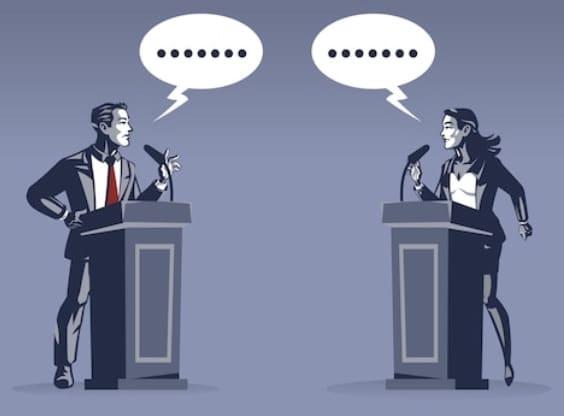
Participating in a debate can be a wonderful learning experience, but it comes with some important caveats. First and foremost, both you and your opponent must be willing to accept that your point of view might be biased, incorrect, or in need of modification. When two debaters have a strong emotional investment in their points of view and are closed to the possibility that their view is flawed, the debate is likely to degenerate from a cerebral to a visceral level, resulting in damage to their personal relationship. That is why the old adage about conversation in groups suggests that you not address topics involving religion, sex or politics. Beliefs in these areas are generally ingrained by tribal loyalties formed early in life and held with emotional intensity.
I rarely engage in conversations on these topics, except with a few close friends whom I regard as highly intelligent. Our opinions are often at opposite ends of the spectrum and we marshal our best arguments to promote our point of view. In the parry and thrust of these debates, I often emerge with a more moderate version of my original opinion. Debates on the existence of God, capitalism vs. socialism, abortion, crime prevention and a host of other complex issues require a variety of points of view for examining the issue in all its many dimensions. If my debating partner launches an argument that I assess to be stronger than mine, I acknowledge the stronger argument and modify my opinion accordingly, pleased that my revised opinion is better informed than it was. There is no loss of ego.
If I think that my debating partner’s argument is weaker than mine, I feel affirmed in my opinion and more comfortable in the knowledge that I have tested its validity against counterargument. It’s a win-win for both of us. In our discussions, we seldom change our opinions 180 degrees, because these points of view have emerged over a long period of time, but we’ve opened the horizons on the various aspects of the issue. In such debates, there are no “winners” and “losers” because we both emerge a little better informed on the issue.
Researchers have found that “open-mindedness” is a characteristic shared by most highly intelligent people. In his recent book Noise: A Flaw in Human Judgment, Daniel Kahneman advocates for what he calls “active open-mindedness.”:
To be actively open-minded is to actively search for information that contradicts your pre-existing hypothesis. Such information includes the dissenting opinions of others and the careful weighing of new evidence against old beliefs. Actively open-minded people agree with statements like this, “allowing oneself to be convinced by an opposing argument is a sign of good character.” They disagree with the proposition that “changing your mind is a sign of weakness” …Active open-minded thinking goes beyond that. It is the humility of those who are constantly aware that their judgment is a work in progress and who yearn to be corrected.
Much of the polarization we see in today’s society could be resolved if people could embrace an active open-mindedness in their discussions of important issues.
